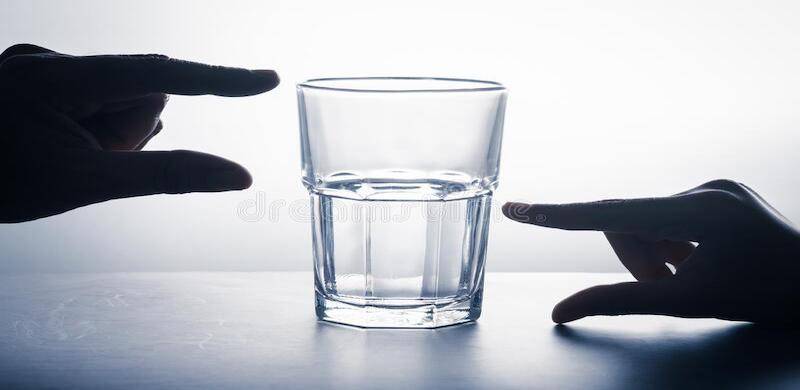
There’s a question that almost every one of us is aware of. “Is The Glass Half Full Or Half Empty?” The optimists answer that the glass is half full because they only look at the half full and ignore the half empty. While the pessimists say that the glass is half empty because they only look at the half empty and ignore the half full, neither of these approaches helps us come up with the right answer since we miss a point.
What we don’t see is: The glass is not half empty or half full; the glass is half empty and half full. It’s not one or the other, it’s both. When we notice only the half empty, we miss the half full and the benefit we can take from it. When we look only at the half full, we ignore the problem, the gap in the glass. By looking at both parts, we allow ourselves to move forward with clarity. The half full tells us we have something and we can use it, but if we take all of it out of the glass, we will end up having nothing in the glass.
This half full, half empty phrase is a message for us. It tells us that in our lives, we get into situations where we don’t have 100% of something, which means we have a portion of it and also its deficiency at the same time. And now it is up to us to decide what we want to do with it. We can look at deficiency and feel sad. We can look at what’s available and feel good. Or we can see this as the opportunity to make the glass full so that we can use what we require and also have it for later. But what if a time comes when we require all that is in the glass? Well, we can use all of it, but before we do so, we must find how we can refill the emptiness of the whole glass for our future reuse.
And it’s not just about water in a glass; it’s about all the things we see and feel that are incomplete in our daily lives. For example, you are hungry and there’s a meal in front of you. You can eat the meal to satisfy your hunger, but if you eat too much, you will be overeating. As a result, you will experience side effects and can get into trouble. Or suppose you are a child who feels unseen and does things to get your parents' attention. And if you do many things that help you get too much attention, what will happen is that you will start losing yourself and will get into a never-ending cycle of attention seeking, and this way, you will create more harm than good. That’s why we must be careful in our approach of filling the emptiness because not controlling the speed of things can result in excess and waste.
Our wisdom gets tested when we find ourselves in the riddle of choices. What we decide to do with what we have, determines what we end up with at the end of the day.
What we don’t see is: The glass is not half empty or half full; the glass is half empty and half full. It’s not one or the other, it’s both. When we notice only the half empty, we miss the half full and the benefit we can take from it. When we look only at the half full, we ignore the problem, the gap in the glass. By looking at both parts, we allow ourselves to move forward with clarity. The half full tells us we have something and we can use it, but if we take all of it out of the glass, we will end up having nothing in the glass.
This half full, half empty phrase is a message for us. It tells us that in our lives, we get into situations where we don’t have 100% of something, which means we have a portion of it and also its deficiency at the same time. And now it is up to us to decide what we want to do with it. We can look at deficiency and feel sad. We can look at what’s available and feel good. Or we can see this as the opportunity to make the glass full so that we can use what we require and also have it for later. But what if a time comes when we require all that is in the glass? Well, we can use all of it, but before we do so, we must find how we can refill the emptiness of the whole glass for our future reuse.
And it’s not just about water in a glass; it’s about all the things we see and feel that are incomplete in our daily lives. For example, you are hungry and there’s a meal in front of you. You can eat the meal to satisfy your hunger, but if you eat too much, you will be overeating. As a result, you will experience side effects and can get into trouble. Or suppose you are a child who feels unseen and does things to get your parents' attention. And if you do many things that help you get too much attention, what will happen is that you will start losing yourself and will get into a never-ending cycle of attention seeking, and this way, you will create more harm than good. That’s why we must be careful in our approach of filling the emptiness because not controlling the speed of things can result in excess and waste.
Our wisdom gets tested when we find ourselves in the riddle of choices. What we decide to do with what we have, determines what we end up with at the end of the day.

